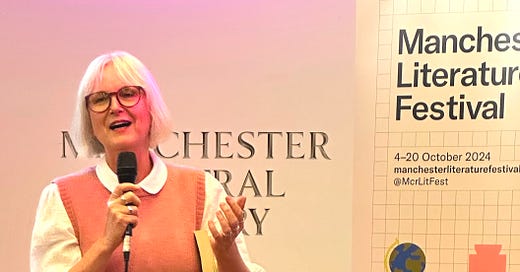I was at an event recently as part of the Manchester Literature Festival and watching other people on stage before me taught me some key things that I’ve realised are key to us as writers - and if you’re a reader, I’d love to know if you agree with these points. Let’s be clear, first, though - I’m not criticising people who gave me the opportunity to observe their mistakes, because I doubt anyone did them the service of guiding them in how to make the most of their session, and they’ve been let down by the publisher in that respect. We’re writers, not performers, after all.
Say your name and the name of your novel - and say them slowly - even if you were introduced by the facilitator. There’s research (and a TEDTalk) that tells us that people need a moment to get into our voice, so we must start with something that isn’t critical before we say our name. For example, we can start with ‘Hello, my name is …’ and that alone lets people get used to our voice and accent. And linked to this, we need to s-l-o-w d-o-w-n, and slower than you think you need to be, too. We’re used to saying our name and the title of our book - the people in the audience are not used to hearing them.
Now, something I learned for if I’m ever a facilitator is to say a person’s name in full again a few minutes into the conversation because now people are interested in this person they’re listening to, but they can’t remember their name. Hopefully there’s a screen with the author’s name and book title on it that the audience can refer to, but I’ve noticed these are often too small to be seen at the back of the room if they are there at all.
Hmmm, I need to learn how to make photos smaller on Substack … scroll down to read more! (I also look like I’m singing … I’m not!) EDITED TO SAY: Thanks Fran Hill for telling me how to make photos smaller. I’m still not singing, whatever size the image is.
OK, back to authorly things I learned. People buy people - if you’re invited to do a reading from your book at an event, rather than being on a panel, avoid going straight into the reading. Be personal, tell people something about you and why you wrote this book. For me it’s because I’ve experienced a mental health crisis, and I’m a suicide survivor. I wrote my novel in part to show that there’s more to mental health recovery than talking therapies, because for some of us talking about what’s going on in our lives is not the problem - it’s shutting our brains up, regulating our nervous system that we need. I’ve pre-prepared something that I can use in events when I’m asked to introduce myself and my book, and I can use a shortened version of that when I’m invited to do a reading.
Following on from that, even if your slot is for a specific length of time, you don’t have to use that whole time. The point of the reading is that you want people to BUY YOUR BOOK - you’re not there to show them how good you are at reading, so be sure to select a section that entices people to want to know more. And remember, you don’t have to use the whole of your time slot. If you can make a better impression by keeping the reading short, then do that.
Practice reading the section you’re going to use - practice it so much that when you read it you’re able to look up at the audience, connect with them, because you know where you are on the page and you won’t lose your place, and you also know what’s coming next. Learn where you need to put the emphasis and inflections, and vary your pace. Read slower than you think you need to. You will switch people off if you read your section with a deadpan, monotone voice at a pace they can’t keep up with.
Have a clear way to finish your reading - whatever you do, avoid coming to the last line, closing your book and rushing off stage. Thank people for listening, repeat your name and the title of your book (SLOWLY!), and smile. If you’re going to be at a table to sell and sign copies of your book, tell the audience, and point to where you will be.
I’m fortunate to have years of performance behind me, so I’m not phased by events or getting on stage, but attending events is teaching me that too many authors are not practiced in this skill. I’ll be doing a mini session for paid subscribers in coming weeks, sharing insights in how to get the most out of author events, so be sure to select your subscription level, and keep a look out for that coming soon.
Readers, what would you love authors to know or do when they are on panels or doing readings at book events?





This is all such good advice, particularly about the name-stating. So many times, the beginning of an interview/conversation goes by in a rush and too many assumptions are made about the audience's knowledge of the writer or their work. (As for Substack photos, it's the little lines on the left/right of the picture. Drag those.)